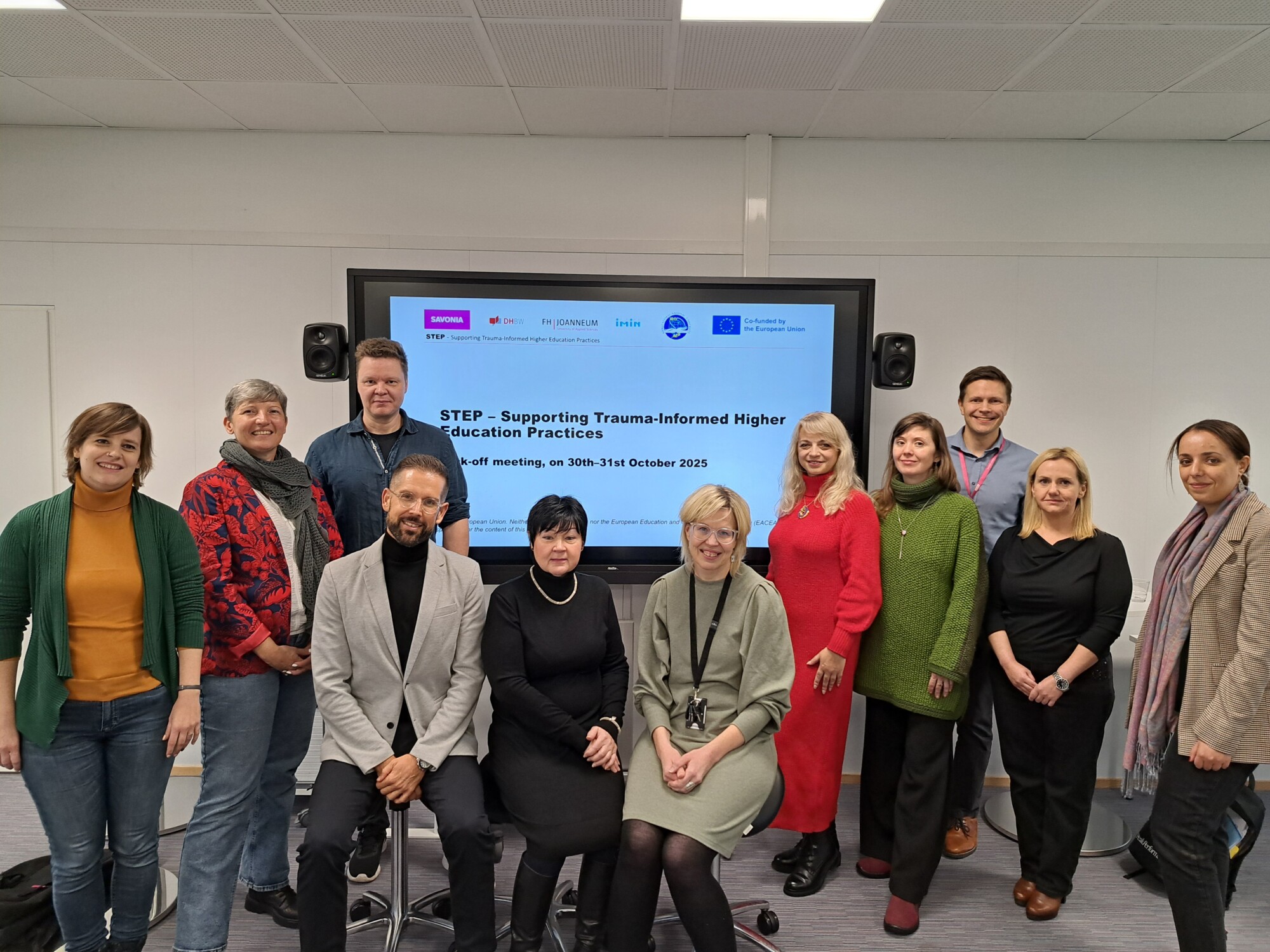
Savonia Article: Psychologically Safe Learning Environments – The STEP Project Strengthens Teachers’ Competencies
This work is licensed under CC BY-SA 4.0
STEP – Supporting Trauma-Informed Teaching in Higher Education
European higher education institutions are increasingly welcoming students who have fled their home countries due to war or crisis. Many of these students have experienced traumatic events that affect their learning and well-being. Stress, fear, and other trauma-related consequences can make studying difficult, and teachers often lack the necessary skills to support these students. This can negatively impact students’ well-being, academic success, and sense of belonging within the higher education community.
The STEP (Supporting Trauma-Informed Teaching in Higher Education) Erasmus+ project (2025-2027) aims to address these challenges. Its main goal is to strengthen teachers’ competencies in trauma-informed approaches and promote the adoption of trauma-informed teaching practices, so that learning environments become psychologically safe and genuinely inclusive for all students.
The project kick-off was held at Savonia University of Applied Sciences (SUAS) on October 30–31. The project brings together 20 experts in trauma, mental health, and pedagogy from five European organisations: SUAS (Finland), Duale Hochschule Baden-Württemberg (Germany), FH JOANNEUM (Austria), Institute for Migration Research (Croatia) and Khmelnytskyi National University (Ukraine).
Planned Actions and Outcomes
The project activities are based on a scoping review of existing research and the results of a survey conducted in all five participating countries. These findings will form the foundation for developing a trauma-informed teaching framework and a train-the-trainer programme. Concrete outcomes will include a curriculum, a guidebook, and open-access learning materials for use across Europe.
The principles of trauma-informed teaching will be integrated into the structures of higher education institutions and teacher education in a sustainable way. This will promote student well-being, inclusion, and long-term impact at the level of education policy in Europe.
A trauma-informed approach in teaching enhances psychological safety for students and learning environments alike. It especially supports the inclusion and academic success of students with migrant backgrounds and those who have experienced trauma.
Encouraging Feedback from the Funder
The Erasmus+ programme is funded by the European Union, and in Finland, it is coordinated by the Finnish National Agency for Education. The funder’s feedback on the project plan was highly encouraging.
According to the evaluation, the STEP project is considered important and timely, as it addresses a clear need to strengthen higher education teachers’ ability to support students with traumatic experiences. The project was praised for its well-designed goals and cost-effectiveness. The consortium was seen as diverse and complementary, with the Ukrainian university bringing valuable practical experience from a war-affected region. The project is expected to have a positive impact on teachers, students, and participating organisations, and its results have the potential to be applied more broadly across the higher education sector. Furthermore, the project was seen to offer clear European added value and has the potential to become a best practice project.
This feedback provides an excellent starting point for the project’s implementation. Over the next two years, the consortium will work closely together to develop and share trauma-informed teaching practices that support inclusive and psychologically safe learning environments across Europe.
Writers:
Pirjo Pehkonen, pirjo.pehkonen@savonia.fi
Jukka Aho, jukka.aho@savonia.fi
Teija Korhonen
Savonia University of Applied Sciences – Finland, https://www.savonia.fi
Florian Steger, Florian.Steger@dhbw.de
Sumaia Al-Ghurbani, sumaia.al-ghurbani@dhbw.de
Robert Lahdo, robert.lahdo@dhbw.de
Duale Hochschule Baden-Württemberg – Germany, https://www.dhbw-vs.de
Elena Stuhlpfarrer, elena.stuhlpfarrer@fh-joanneum.at
Sabine Hötzl, sabine.hoetzl@fh-joanneum.at
FH JOANNEUM Gesellschaft– Austria, https://www.fh-joanneum.at
Marko Turk, Marko.Turk@imin.hr
Iva Tadić, Iva.Tadic@imin.hr
Institute for Migration Research – Croatia, https://www.imin.hr
Kateryna Skyba, skybakm@khmnu.edu.ua
Khmelnytskyi National University – Ukraine, https://khmnu.edu.ua/
Funded by the European Union. Neither the European Union nor the European Education and Culture Executive Agency (EACEA) can be held responsible for the content of this publication.
